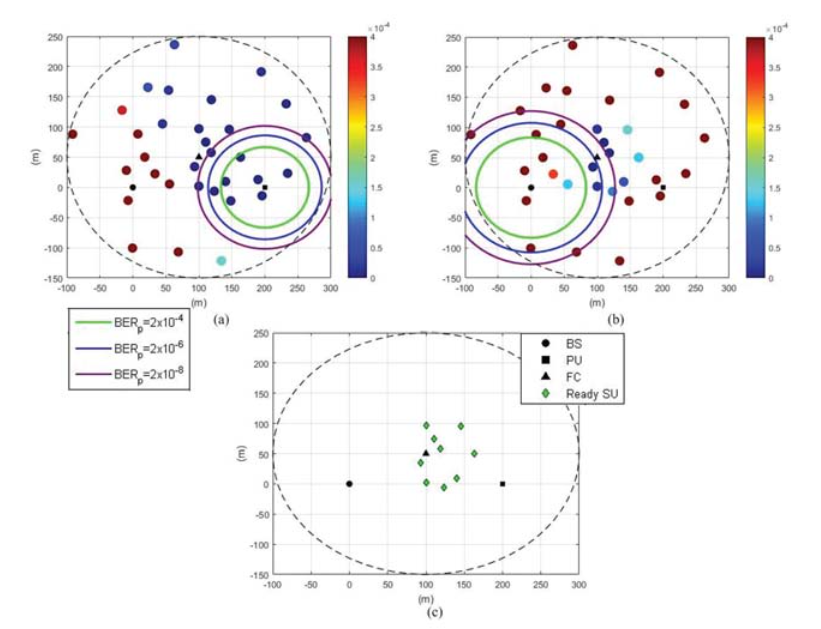Spectrum allocation scheme on multi-user MIMO cognitive radio systems
Main Article Content
Abstract
In this paper, the spectrum allocation scheme has been proposed to enable complete spectrum sharing in multi-user MIMO cognitive radio (CR) systems. Performance analysis has been developed to evaluate bit error rate (BER) of each secondary user (SU) because of the effect of node member positions in multi-user CR network. In order to achieve this SUs which are ready to receive data and can communicate by ignoring any damage caused to the primary user (PU)’s communication at the same time. The authors have successfully used this method to process each frequency channel and to allocate channel to the appropriate SUs. The advantages of this system are as follows: 1) the performance analysis is able to support multi-user CR systems, 2) this research can clearly indicate the effect of the positions of node members in the CR network on their service quality, 3) the impact on both downlink and uplink operations are combined in order to make the final decision for communication, and 4) the spectrum allocation scheme which is able to allocate frequency channels for all users in CR systems is presented. The simulation results that are provided, show the performance of SU in term of BER inside their coverage areas along with the effect of GPS error. The results present the complete allocation of spectrum sharing for multi-user CR systems. The outcome of this research is very useful in further development of CR systems. In addition to this, it can be easily implemented in practice at the stage of spectrum sharing. Each SU can decide for themselves whether their position is adequate for good quality communication or not.
Article Details
References
R. Laikanok, P. Uthansakul, M. Uthansakul, Spectrum sensing with integration of energy detector and diversity techniques for MIMO systems, in: Electrical Engineering/Electronics, Computer, Telecommunications and Information Technology (ECTI-CON) (2014) 1 - 4.
C. Huifang, X. Lei, N. Xiong, Reputation-based hierarchically cooperative spectrum sensing scheme in cognitive radio networks, China Communications 11(2014) 12 - 25.
I. Hwang, J. W. Lee, Cooperative spectrum sensing with quantization combining over imperfect feedback channels, IEEE Transactions on Signal Processing 68(2017) 721 - 732.
M. Grissa, A. A. Yavuz, B. Hamdaoui, Preserving the location privacy of secondary users in cooperative spectrum sensing, IEEE Transactions on Information Forensics and Security 12(2017) 418 - 431.
S. Pandit, G. Singh, Backoff algorithm in cognitive radio MAC protocol for throughput enhancement, IEEE Transactions on Vehicular Technology 64(2015) 1991 - 2000.
D. B. Rawat, S. Shetty, C. Xin, Stackelberg-game-based dynamic spectrum access in heterogeneous wireless systems, IEEE Systems Journal 10(2016) 1494 - 1504.
S. Puranachaikeeree, Transmitting and receiving beamforming for interference cancellation in the downlink of cognitive radio system [dissertation], Bangkok: King Mongkut's University of Technology Thonburi (2010).
R. Zhang, On peak versus average interference power constraints for protecting primary users in cognitive radio networks, IEEE Transactions on Wireless Communications 8(2009) 2112 - 2120.
F. A. Khan, K. Tourki, M. S. Alouini, K. A. Qaraqe, Performance analysis of a power limited spectrum sharing system with TAS/MRC, IEEE Transactions on Signal Processing 62(2014) 954 - 967.
K. Tourki, F. A. Khan, K. A. Qaraqe, H. C. Yang, M. S. Alouini, Exact performance analysis of MIMO cognitive radio systems using transmit antenna selection, IEEE Journal on Selected areas in communications 32(2014) 425 - 438.
P. Sripadungtham, Solar home with energy management by frugal discharge, Journal of Thai Interdisciplinary Research 13(2018) 64-68.
G. Yang, B. Li, X. Tan, X. Wang, Adaptive power control algorithm in cognitive radio based on game theory, IET Communications 9(2015) 1807 - 1811.
T. K. Kim, H. M. Kim, M. G. Song, G. H. Im, Improved spectrum-sharing protocol for cognitive radio networks with multiuser cooperation, IEEE Transactions on Communications 63(2015) 1121 - 1135.
S. Vassaki, M. I. Poulakis, A. D. Panagopoulos, State-based potential power allocation game in a cooperative multiuser network, IET Communications 10(2016) 1320 - 1328.
B. Khalfi, M. B. Ghorbel, B. Hamdaoui, M. Guizani, Distributed fair spectrum assignment for large-scale wireless DSA networks, in: International Conference on Cognitive Radio Oriented Wireless Networks (2015) 631 - 642.
R. Laikanok, P. Uthansakul, D. Widjaja, Position-based spectrum sharing analysis in multiI-User IMO cognitive radio systems, Suranaree Journal of Science and Technology 25(2018) 125 - 130.
A. Goldsmith, Wireless communications, Cambridge: Cambridge University Press (2005).
ETSI T. 136 101 V10. 3.0 (2011-06) LTE. Evolved universal terrestrial radio access (E-UTRA).


